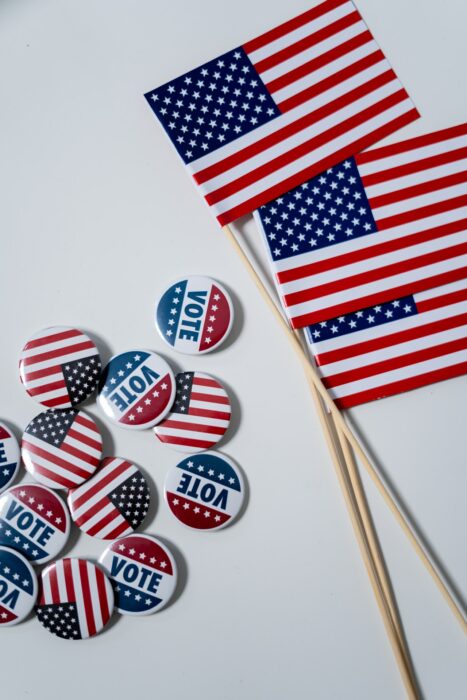The Silent Majority Or The Minority Underground
Tomorrow is the US federal election day, or as many commentators have began to refer to it, the last day to vote in the “season of voting.” I’m of the mindset that the fixed election day provides the most fair manner for the election of our leaders, but as it happens, the Constitution, while setting the day for the Electoral College to begin its voting procedure, leaves the actual administration of elections up to the states.
Consequently, we see a wide variety of mail-in voting and early voting and absentee voting and the like. Here in California we basically have three means of voting. All registered voters received a ballot which we can then fill in and mail, fill in and drop off at one of the voting boxes in places such as libraries, or vote in person on “Election Day” using an electronic voting machine. This latter option is different from the past in-person voting. Instead of local precincts which were always in the community—places such as elementary schools or a neighbor’s garage or a high school or church—now we can vote in any place in the county. There are voting centers all over and one of the pieces of voting information we received was a booklet with the location of all those voting centers.
Nothing is simple any more, when it comes to voting.
All that aside, when the results are finally tabulated and the Electoral College votes assigned, we will have a winner—either a new President or a President entering his second term in office. Which means, all those who voted for the winner will rejoice and all those who voted for the loser will bemoan the direction in which the country will go in the next four year.
For years, Conservation voters, including many Christians, were known as the “silent majority.” But certainly Christians didn’t start out in a world in which they were the majority.
Rather, that first fearful band of followers huddled in an upper room, having recently seen the resurrected Christ, changed from perhaps several dozen, perhaps as many as 150, into a group of 3000 who responded to Peter’s sermon on the day of Pentecost. They were known as the followers of The Way. Their number soon swelled, and as the Bible informs us, spread from Jerusalem as persecution set in. As the Apostle Paul and others took the truth about Jesus to the Gentiles—Romans, Greeks, people living in Asia Minor—the numbers grew much faster. But a majority? Not close.
Of course there’s serious doubt that Christians have ever been a majority, even in the Roman Empire when conquered people were required to join the church—as if by decree and obedience to a law someone could become part of God’s family. No, many, many throughout history have been “in name only” Christians.
So, too, in the US. But of course Christians aren’t the only citizens who believe in law and order and the rule of the Constitution and the rights preserved and protected in that document. Perhaps the majority of Americans still believe in those fundamental principles that have made the US, the US. We have a unique democratic Republic, and for most of our 200 plus years of existence, it has served us well.
All this to say, the way the government is set up with checks and balances and three distinct branches and the people being the ultimate responsible agent, we have not experienced insurrection. Unrest, yes, and some fear that if President Trump wins the election, the far left will expand their riots and protests to become a type of movement against the existent governmental structure.
For years, the political party of the losing candidate for President has dug in to make sure they don’t lose the next time. Incumbent legislators have historically been harder to remove from office, but Presidents are limited to two terms, so every four years, there’s the chance to replace a President who has not served the people well. And every eight years, there’s a guarantee a new person will be in that office.
 In dystopian stories and many fantasy novels, the government can only be changed by violent overthrow. I mean, what person or group wants to give up power? So we have many stories about a group working underground, much like the French resistance did during World War II, in order to bring about change.
In dystopian stories and many fantasy novels, the government can only be changed by violent overthrow. I mean, what person or group wants to give up power? So we have many stories about a group working underground, much like the French resistance did during World War II, in order to bring about change.
My belief is that Christians are not, and have never been, the silent majority, nor are we to be a minority underground.
We may some day have to go underground. The Cancel Culture mandate could one day apply to Christianity. As it is, to say that something society accepts, such as homosexuality, is a sin, marks the believer as “hateful.” Never mind that we believe God gave us laws to obey which are good for us. So it’s actually better for humanity not to murder, and as Jesus explained, not to hate. It’s actually better for us not to commit adultery, or as Jesus explained, not to lust after someone else. These are laws God gave to us because He loves us and knows our lives will be more fulfilled, happier, successful, more glorifying to Him if we obey them.
But a society that rejects God, says we can, and in some cases, should, ignore His laws. And those who want to follow them are hateful. It’s pretty convoluted thinking, but that’s the world we live in.
All that to say, there may be a day when Christians in America do become a minority underground. But unlike those in so many dystopian novels, the goal is not to establish an earthly kingdom. Jesus didn’t come to take over as an earthly King, and we His followers don’t exist to create an earthly government that follows God’s law either.
Yes, a free government that allows Christians to speak freely about our faith and to worship openly, is “easier.” But I don’t think the goal of the Christian life is “easy.”
To bring this to some kind of conclusion, Christians can rest assured that whether our country protects our rights as we know them, or not, we can know that God is still on the throne. He will not be caught off guard by the election results. Somebody will—either the media reporting Mr. Biden’s lead in the polls or the pundits predicting a “red wave”—but God will not be one of them. He will do what’s right, and we His people can be assured about that.






























“… the goal is not to establish an earthly kingdom.”
I have nothing to add, but well said.